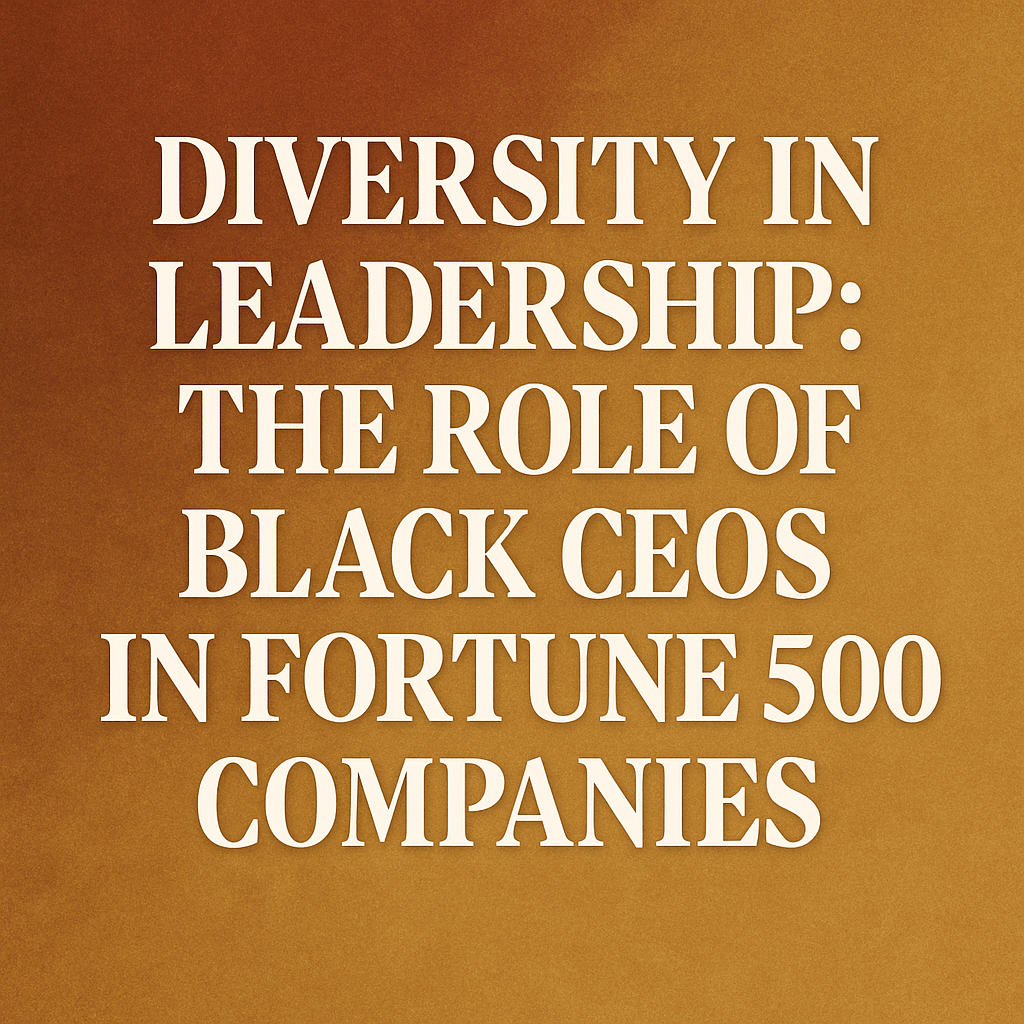Diversity in Leadership: The Role of Black CEOs in Fortune 500 Companies

Since its inception in 1955, Fortune has meticulously ranked the 500 largest U.S. companies by revenue, providing insights into the dynamic landscape of corporate leadership. Over the decades, the comings and goings of more than 2,000 chief executives have been documented, with a stark emphasis on diversity and representation within this elite group. Until now, only 28 of these CEOs have been Black, with the most recent appointment being Michael Bender, who took the reins at Kohl’s in early May 2024.
The Slow but Steady Progress of Black Representation
Despite incremental growth in the presence of Black CEOs in the Fortune 500, corporate leadership positions remain predominantly occupied by individuals from non-diverse backgrounds. An alarming statistic from a 2021 McKinsey study highlighted that, while Black Americans represent approximately 13% of the total U.S. workforce, they constitute only 7% of managerial roles and a mere 4% to 5% of senior management positions. This disparity underscores the pressing need for organizations to address systemic barriers that hinder equitable representation.
Current Landscape of Black CEOs within the Fortune 500
As of the 2025 Fortune 500 list, there are nine companies led by Black CEOs, marking a slight increase from 1.6% in previous years. The combined revenue generated by these leaders in fiscal year 2024 amounted to $244.76 billion, a significant contribution to the U.S. economy.
- Marvin Ellison, President and CEO of Lowe’s, leads the pack with $83.67 billion in revenue.
- Thasunda Brown Duckett, CEO of TIAA, reported $46.95 billion.
- Christopher Womack, CEO of Southern Company, at $26.72 billion.
- Calvin Butler Jr., CEO of Exelon, generated $23.03 billion.
- Other leaders include David Bozeman (C.H. Robinson Worldwide), Michael Bender (Kohl’s), and René Jones (M&T Bank).
The representation of Black women in these leadership positions is particularly disheartening, with only two female CEOs in this cohort. This raises questions about the intersectionality of race and gender within corporate structures.
Leadership in Context: Marvin Ellison at Lowe’s
Marvin Ellison, at the forefront of corporate innovation since becoming Lowe’s CEO in 2018, has a remarkable legacy as the first Black executive to lead two separate Fortune 500 companies, having previously been at the helm of J.C. Penney from 2015 to 2018. Starting his career as a $4.35-an-hour employee at Target, Ellison’s ascent to the top of corporate America is not only remarkable but also serves as an inspiration to future generations.
In 2024, Ellison’s total compensation reached $20.16 million, reflecting not just his leadership capabilities but also the competitive landscape of executive remuneration. Under his stewardship, Lowe’s reported nearly $7 billion in profits for fiscal year 2024, although this number was affected by various market challenges.
Market Dynamics Affecting Lowe’s Performance
In the 2025 Fortune 500 ranking, Lowe’s experienced a decline of three spots, attributed primarily to economic pressures including disruptions in the housing market and tariff threats, which impacted overall sales performance. The company recorded a same-store sales dip of 1.7% in the first quarter. However, Ellison remains optimistic about Lowe’s future, citing investments in technology and strategic initiatives aimed at navigating these turbulent market conditions.
In April, Lowe’s made a strategic acquisition of Artisan Design for $1.33 billion, enhancing its foothold in the professional homebuilder market. This move is aimed at better competing with Home Depot, particularly as demand for do-it-yourself home projects has shifted dramatically in recent years. Ellison noted that this acquisition and an emphasis on domestic sourcing—60% of Lowe’s supply purchases being made domestically, with only 20% from China—could help mitigate some impacts from tariffs and supply chain vulnerabilities.
The Broader Implications for Corporate Diversity
The slow but steady increase in Black representation at the CEO level within the Fortune 500 raises important discussions regarding corporate diversity, equity, and inclusion strategies. Businesses that actively promote diverse leadership teams are likely to be better positioned to innovate and respond to a changing global market landscape.
According to thought leaders in the field, fostering an inclusive corporate environment not only benefits organizational culture but also contributes positively to financial performance. Firms like Lowe’s are at the forefront of these discussions, demonstrating how diverse leadership can influence market dynamics and consumer perception.
Conclusion
The representation of Black CEOs in the Fortune 500 serves as a critical indicator of progress (or lack thereof) towards corporate diversity and inclusion. The journey of leaders like Marvin Ellison continues to inspire stakeholders across various industries as the conversation around equity in leadership roles remains critical.
As the corporate landscape continues to evolve, the emphasis on inclusive leadership will be paramount in building companies that not only reflect the diversity of society but also leverage it for sustained growth and innovation.
For more insights on corporate leadership and diversity trends, stay tuned for updates in the dynamic world of business.